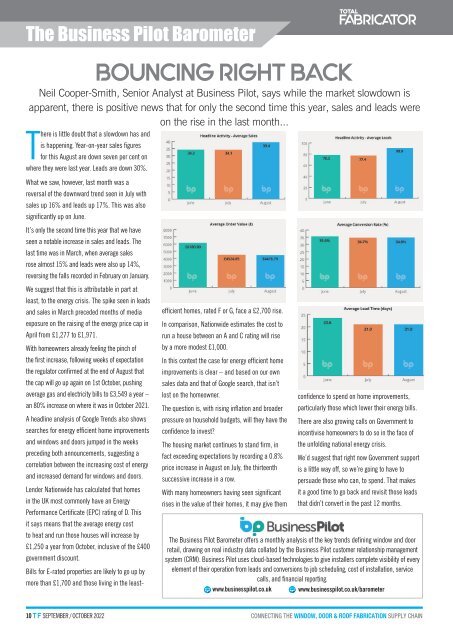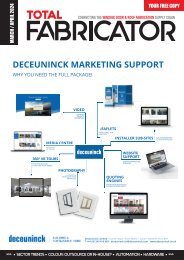September/October 2022
You also want an ePaper? Increase the reach of your titles
YUMPU automatically turns print PDFs into web optimized ePapers that Google loves.
The Business Pilot Barometer<br />
BOUNCING RIGHT BACK<br />
Neil Cooper-Smith, Senior Analyst at Business Pilot, says while the market slowdown is<br />
apparent, there is positive news that for only the second time this year, sales and leads were<br />
on the rise in the last month...<br />
There is little doubt that a slowdown has and<br />
is happening. Year-on-year sales figures<br />
for this August are down seven per cent on<br />
where they were last year. Leads are down 30%.<br />
What we saw, however, last month was a<br />
reversal of the downward trend seen in July with<br />
sales up 16% and leads up 17%. This was also<br />
significantly up on June.<br />
It’s only the second time this year that we have<br />
seen a notable increase in sales and leads. The<br />
last time was in March, when average sales<br />
rose almost 15% and leads were also up 14%,<br />
reversing the falls recorded in February on January.<br />
We suggest that this is attributable in part at<br />
least, to the energy crisis. The spike seen in leads<br />
and sales in March preceded months of media<br />
exposure on the raising of the energy price cap in<br />
April from £1,277 to £1,971.<br />
With homeowners already feeling the pinch of<br />
the first increase, following weeks of expectation<br />
the regulator confirmed at the end of August that<br />
the cap will go up again on 1st <strong>October</strong>, pushing<br />
average gas and electricity bills to £3,549 a year –<br />
an 80% increase on where it was in <strong>October</strong> 2021.<br />
A headline analysis of Google Trends also shows<br />
searches for energy efficient home improvements<br />
and windows and doors jumped in the weeks<br />
preceding both announcements, suggesting a<br />
correlation between the increasing cost of energy<br />
and increased demand for windows and doors.<br />
Lender Nationwide has calculated that homes<br />
in the UK most commonly have an Energy<br />
Performance Certificate (EPC) rating of D. This<br />
it says means that the average energy cost<br />
to heat and run those houses will increase by<br />
£1,250 a year from <strong>October</strong>, inclusive of the £400<br />
government discount.<br />
Bills for E-rated properties are likely to go up by<br />
more than £1,700 and those living in the leastefficient<br />
homes, rated F or G, face a £2,700 rise.<br />
In comparison, Nationwide estimates the cost to<br />
run a house between an A and C rating will rise<br />
by a more modest £1,000.<br />
In this context the case for energy efficient home<br />
improvements is clear – and based on our own<br />
sales data and that of Google search, that isn’t<br />
lost on the homeowner.<br />
The question is, with rising inflation and broader<br />
pressure on household budgets, will they have the<br />
confidence to invest?<br />
The housing market continues to stand firm, in<br />
fact exceeding expectations by recording a 0.8%<br />
price increase in August on July, the thirteenth<br />
successive increase in a row.<br />
With many homeowners having seen significant<br />
rises in the value of their homes, it may give them<br />
confidence to spend on home improvements,<br />
particularly those which lower their energy bills.<br />
There are also growing calls on Government to<br />
incentivise homeowners to do so in the face of<br />
the unfolding national energy crisis.<br />
We’d suggest that right now Government support<br />
is a little way off, so we’re going to have to<br />
persuade those who can, to spend. That makes<br />
it a good time to go back and revisit those leads<br />
that didn’t convert in the past 12 months.<br />
The Business Pilot Barometer offers a monthly analysis of the key trends defining window and door<br />
retail, drawing on real industry data collated by the Business Pilot customer relationship management<br />
system (CRM). Business Pilot uses cloud-based technologies to give installers complete visibility of every<br />
element of their operation from leads and conversions to job scheduling, cost of installation, service<br />
calls, and financial reporting.<br />
www.businesspilot.co.uk www.businesspilot.co.uk/barometer<br />
10 T F SEPTEMBER / OCTOBER <strong>2022</strong><br />
CONNECTING THE WINDOW, DOOR & ROOF FABRICATION SUPPLY CHAIN

















